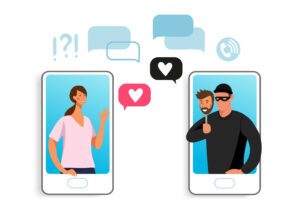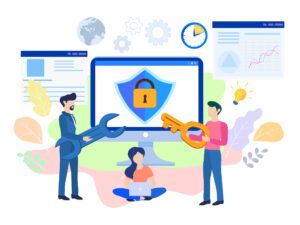Consumers Should be at the Center of a New Distributed Identity Model on the Internet
Sorry, little Johnny isn’t getting those sneakers he wants for Christmas this year. Automated shopping bots have siphoned up the supply of Yeezy’s and now they’re selling for $600 on eBay. The same thing is happening to just about anything on the Internet that has limited supply — from concert tickets to Covid vaccine reservations to PlayStations.
What’s happening in the shoe reseller market is but one, admittedly small, sign that the Internet is breaking — or is broken.


Identity theft is at an all-time high, hate speech continues to fester unchecked on social networks, and reports of online child grooming have reached a record high. Romance scams on dating apps and fake buyers on places like Craigslist are on the rise, while civil discourse and Internet safety are on the decline. Bots and bad people — metaphorically, the guy in the hoodie at his keyboard — seem to be taking over the Internet. Depending on who you are, he may be feeding you political disinformation, stealing your personal information, or catfishing you on a dating app. He’s operating under a concealed name and is almost always up to no good.
The Call to End Anonymity on the Internet
Should we un-mask him?
Some have called for eliminating anonymity as a panacea for all the ills that plague the Internet. Legislation is being discussed in Congress which would require providers of social media services to verify the identity of their users and mandates that social media companies report fake IDs to the Federal Trade Commission and the Department of Justice.


Bad idea, and likely unconstitutional. Plus, consumers react negatively towards the idea of giving social media giants more of their personal information. It’s not practical in form or substance.
The Marketplace for Identity and Changing Consumer Preferences
Any solution to the anonymity conundrum needs to address the reality of today’s Internet, the changing demographics of Internet users, and the increasing awareness of consumers about the use and misuse of their personal information.
Underlying the Internet is an economy of data. Internet giants have made billions off our personal information, benefiting from an environment in which constant disclosure and collection is a requirement to use the “free” apps that we frequent every day. This isn’t changing anytime soon, but the power dynamics between Big Tech and consumers get re-stacked with each disclosure that another hundred million accounts have been hacked. Consumers don’t want to turn over more of their personal information to the social media giants. Time is ripe for a new solution and a new paradigm that doesn’t involve consumers handing over an ever-increasing amount of their personal information.


The demographics and preferences of Internet users are changing. More than half of Americans are now Millennials or younger. They are migrating away from places like Facebook (which has a “real name” policy) towards apps and services where pseudonymity is the norm. From Instagram to SnapChat, these apps have different assumptions about what personal information their users want to share with the public. Even Bytedance, the Chinese company that owns TikTok, doesn’t ask users for their real name when they sign up.
Consumers are having an awakening about their role in the marketplace of identity. In a recent survey, 89% of consumers stated that they care about data privacy and want more control of their personal information, and 70% said they’re willing to spend time and money to protect their data. This augers in favor of a solution that gives consumers more control of their identity information and puts them at the center of decisions about how their personal information is collected, stored, and used.
Creating a New Digital Identity Framework
So, what’s the path forward?
Below are three principals which should be considered as we create a new identity framework for the Internet:
Consumers should have the choice to remain anonymous or pseudonymous on the Internet. It protects their First Amendment rights and ensures the free exchange of ideas. Each digital interaction or transaction is unique. In some cases, sharing personal information is entirely appropriate and warranted, while in other cases, it might create personal embarrassment or exposure with family, friends, or work colleagues. Consumers should decide for themselves what personal information — if any — should be disclosed online. They alone should have to power to decide when disclosing personally identifiable information is warranted.
Consumers should be given a way to protect their privacy and control their digital identity. Today, the average business user of the Internet has 191 passwords. Total insanity, I know, but it’s really a result of the way the Internet was created by DARPA in the 1960s and 1970s. Is there any wonder why there are four billion identities for sale on the dark web? More of our personal information is available in more places than ever before. Any solution has to address this problem. Consumers should be given a way to own their identity information so they can control how it’s used. They need a “digital identity wallet” that puts them at the center of a new distributed identity model on the Internet.


Each digital persona should be tied to a verifiable identity. Let’s deal with the reality of the Internet today — Facebook deletes a billion fake accounts a quarter! It’s a mess out there and we are largely suffering from what happens when account creation is divorced from identity. Said differently, we’ve come to accept the fact that you don’t need to be a real person to create an account on many of the Internet’s largest platforms. It’s created a massive trust gap for consumers that needs to be solved for the Internet to prosper. Absent taking away #1 above, we have a responsibility to address digital personas that aren’t tethered to anything in the real world. Trust requires Identity verification, but take note — the decision to share personal information is best left between peers in a network. They’re in the best position to decide what information to share, with whom, and when. If consumers owned a “digital identity wallet” tied to a verified identity, they could choose to remain anonymous, or pseudonymous, while providing the assurance that there’s a real person behind that guy with the hoodie at his keyboard.
At Dentity, we’re on a mission to put consumers at the center of a new identity model by following the above principals. It’s early days, and we acknowledge that there isn’t one solution that will work for every business and every consumer, but thus far, consumers are telling us that we’re on the right track. Come join us!








